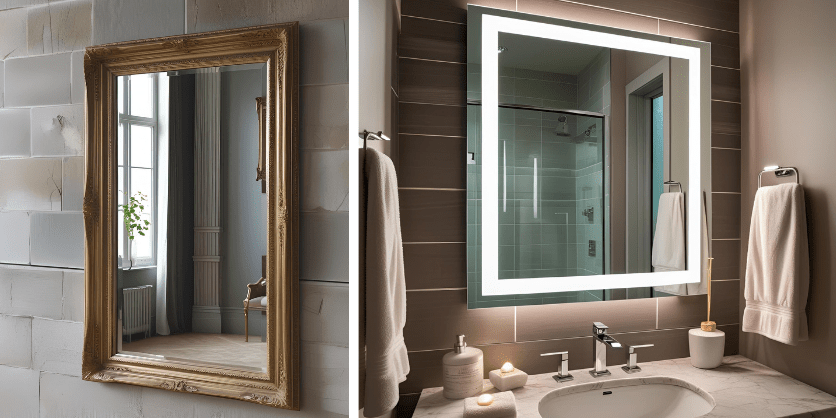New Anti-Dumping Ruling on Float Glass to Raise Price on Lighted Mirrors & Related Products by Nearly 400%

While most headlines have been keeping score of fluctuating tariff amounts on goods imported from China and other countries – most recently, the greater impact on India and Brazil – there is another duty that went into effect last month (July 15) that is not as well-known. If you haven’t heard the term “float glass” before, it’s a material critical in the manufacture of glass shelves, tabletops, mirrors (plain glass as well as with integrated LED), and decorative mirrored wall panels.
Two domestic glass factories located in Pennsylvania – Vitro Flat Glass, LLC, and Vitro Meadville Flat Glass, LLC – filed a petition with the U.S. Department of Commerce’s International Trade Administration, citing concern that float glass manufactured in China and Malaysia is being sold below fair market value (aka “dumped”) or benefits from unfair subsidies, which would put domestic glass manufacturers at a disadvantage. The petition was filed on November 21, 2024, and the Department of Commerce initiated an investigation on December 31, 2024. Since then, the filing has undergone the usual series of steps that culminated in the “preliminary affirmative anti-dumping duty determination” on float glass products that went into effect on July 15. (See details of that ruling here.)
According to documentation from the U.S. Department of Commerce, the country of origin of each float glass product is determined by the location where the sodalime-silica glass is first manufactured.
Hardest hit are Canadian lighting manufacturers that offer mirrors because in addition to the new duty on the country of origin for float glass, Canadian products entering the U.S. carry a 35% tariff as of August 1 independent of the float glass duty.
Company presidents of Eurofase and Artcraft sent out letters to distributors, warning of the unavoidable price increase.
Howard Bernstein, president of Artcraft, wrote, “This ruling imposes tariffs that increase the landed cost of these goods by 384%, creating the need for an immediate adjustment to our selling prices for all LED mirrors. We appreciate that this is sudden and not in keeping with the Artcraft practice of providing you advance notice. We would not have taken this action if the tariff changes were absorbable — but raising costs by nearly 400% without raising prices is simply impossible. We are trying to balance being in full compliance with U.S. Federal Trade Policy, while also being sensitive to your business needs and advance warning of price changes. We are committed to navigating this unpredictable and volatile landscape with transparency, sensitivity, and integrity and we feel uncomfortable and apologize for this sudden and rather large price increase caused solely because of the 384% increase in tariffs and therefore landed costs.”
For Eurofase, which had recently expanded its decorative LED-illuminated mirror category several markets ago, the new duty is an especially hard blow. Rob Zeidel, president, and Zach Sharon, vice president, of Eurofase, jointly penned a letter to customers that spelled out the new duty costs regarding mirrors and added that the company will be “suspending all new and existing backorders with U.S. destinations.” The letter continued, “We understand this change is both sudden and disruptive. It may affect customer discussions, active projects, and outstanding orders. Please know that Eurofase is fully complying with U.S. Federal Trade Policy, and we’re committed to navigating this shift with transparency and integrity. We are actively exploring all available options to restore viability and value to this important and growing category.”
For lighting showrooms and electrical distributors, the unexpected price increase will undoubtedly affect retail sales as well as future orders going forward. For those wishing to explore domestic mirror and LED-illuminated mirror resources, Electric Mirror Company in Washington State and Baci by Remcraft in Miami are two manufacturers who cater to the hospitality and residential markets.








